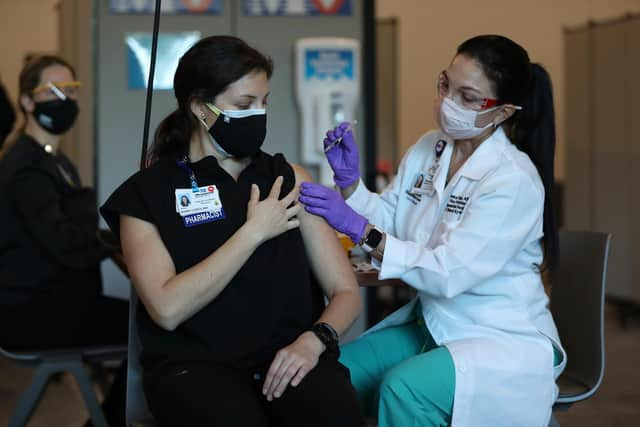Covid booster vaccinations are still a matter of life and death and vital for the NHS – Dr Gwenetta Curry
There is clear evidence that Covid jabs have had a tremendous impact on the reduction of deaths from the virus. It has been estimated that vaccines saved nearly 20 million lives in 185 countries during the first year of their use, with deaths two-thirds lower than they could have been.
Although death rates remain lower than during the peak of the pandemic and, for many, life has returned to ‘normal’, the threat still remains.
Advertisement
Hide AdAdvertisement
Hide AdAccording to the Office for National Statistics, Scotland’s Covid rates remain the highest of all four nations with one in 45 people in private homes testing positive compared to only one in 110 people in Wales.
The risk of reinfection has been a major concern, particularly among those who have had severe reactions during their first infections. The risk of reinfection was about five times higher when the Omicron variant was dominant, rather than Delta.
With high levels of community transmission of the virus, there have been and will continue to be more mutations of Covid. At the moment, the Omicron sub-variant, BA5, is the most dominant variant in the UK.
It’s important not to become complacent with where things are now as the situation can dramatically change with colder months approaching. The new booster vaccine is said to target the Omicron variant which will hopefully avoid a major increase in hospitalisations in the winter months.


Currently, hospital admission rates have decreased in most age groups, except for those under 15 years where the rates increased. The latest figures showed the highest admissions were for those aged over 85 with lowest for children aged five to 14, a pattern that has remained consistent throughout the pandemic.
The vaccine campaign to increase booster jabs this autumn will be imperative to reduce the impending pressure on the already overworked NHS staff.
NHS staff have worked endlessly throughout the pandemic to take care of all those in need of medical care and many have experienced burnout.
Research by the King’s Fund found that NHS staff are 50 per cent more likely to experience chronic stress, with staff shortages, high workload, and pressure to maintain a high quality of patient care contributing to the problem.
Advertisement
Hide AdAdvertisement
Hide AdNHS has experienced vacancies as high as 120,000 and a turnover rate of 30 per cent, with the social care workforce the most fragile. To ensure the stability of the NHS remains intact, we must all do our part and get the booster jabs when made available for our age group.
As of the first week of September, the most vulnerable groups in the UK have been offered their autumn booster vaccine. A record number of 3,100 sites, including GP practices and community pharmacies, are expected to be part of the rollout, with new sites joining the programme to increase the accessibility of the jabs. Please check with NHS Inform to see if you are eligible for the latest booster at a clinic near you.
Dr Gwenetta Curry is an Edinburgh University lecturer on race, ethnicity and health
Comments
Want to join the conversation? Please or to comment on this article.

